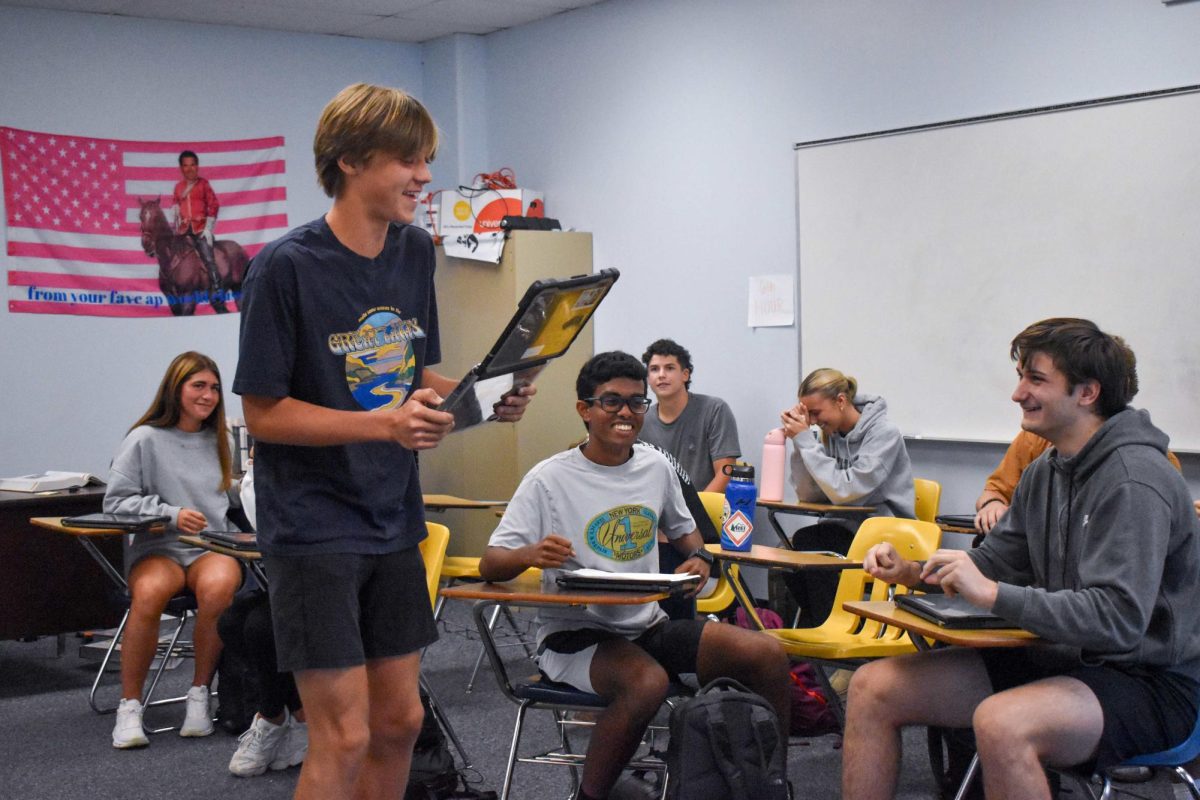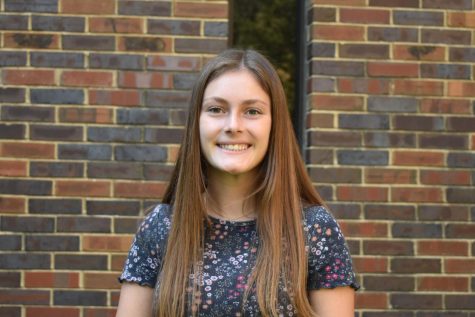After sophomore Zeina DaboulŌĆÖs ordinary two week family trip to Saudi Arabia turned into a two month long stay, due to COVID-19, Daboul is now stuck 7,247 miles away from her home, unaware of when she will return.┬Ā
Having to adapt to an eight hour time difference while shifting to eLearning has made DaboulŌĆÖs transition very different from her peers.┬Ā
ŌĆ£[The timing] didnŌĆÖt bother me too much, but it did take away from the time that I spent with family. Taking into consideration the fact that we came to Saudi Arabia to spend time with family, I did sometimes put off studying for another time. When we have a gathering during school time, I would always give up studying for it,ŌĆØ Daboul said.┬Ā ŌĆ£If I were in Saint Louis, I would not have had to do that, so I had to learn how to balance studying and family.ŌĆØ
Daboul says finding a balance between family and studying became more difficult after the month long Muslim holiday Ramadan began April 23.┬Ā
ŌĆ£[The time difference] grew harder when Ramadan came. In order to not be sleepy [during Suhoor], I would stay awake the whole night. I would sleep after eating at 4:30 a.m. and wake up at 1:30 or 2:00 p.m. This took away a lot of the daytime that I would use to study, so I had to adjust to working during those three hours from 12:00 a.m. to 3:00 a.m. That was the biggest obstacle that I faced,ŌĆØ Daboul said.┬Ā
The situation regarding COVID-19 differs in Saudi Arabia compared to the United States. Having significantly fewer cases than the United States, Saudi Arabia has had several short periods of quarantine, usually 24 hours long.┬Ā
ŌĆ£The one big thing that bothers me is the fact that we are having a 24-hour closure on Eid. Eid is a celebration that marks the end of Ramadan and fasting, and we always spend it celebrating with family. We won’t be able to do that this year,ŌĆØ Daboul said.┬Ā
Even from a different nation, Daboul has noticed that the COVID-19 pandemic has revealed discrepancies and inequalities.┬Ā
ŌĆ£[COVID-19] may last a long time, and it will continue to reveal faults in [the U.S.] healthcare system, the economy, education and many other things, but we have to grow accustomed to it and develop ways that lessen its effects on different aspects of our lives,ŌĆØ Daboul said.┬Ā


![Sophomore Zeina Daboul poses with her sister in Saudi Arabia. Daboul felt that the situation regarding COVID-19 is more regulated in Saudi Arabia. ŌĆ£To me, I think the situation here is a lot more controlled than in the United States. The U.S. is having an increasing number of cases each day, while we have a constant number every day,ŌĆØ Daboul said. ŌĆ£The U.S. has also been struggling with its healthcare system and how it's handling the situation, and while I am pretty sure that [Saudi Arabia] has the same problem, the issue is magnified in the U.S. due to its size and huge population.ŌĆØ](https://pwestpathfinder.com/wp-content/uploads/2020/05/zeina-675x900.jpg)

![Freshman Daphne Stokes looks at a table with Veterans Day flyers and information on Nov. 11. Stokes, along with other West High students, like senior Alexander Lewinski, passed by the table in the cafeteria with army recruitment information and giveaways for students to observe during lunch. ŌĆ£Talking with [the recruiters] has definitely helped me [find] where I wanted to go, more than anything else,ŌĆØ Lewinski said.](https://pwestpathfinder.com/wp-content/uploads/2025/11/DSC_1227-2-1200x800.jpg)
![Helping a customer, print room assistant Gretchen Williams operates her booth at the West High Craft Fair from Oct. 25-26. This was WilliamsŌĆÖ first time participating in the Craft Fair with her new craft shop, Gs Beaded Boutique. ŌĆ£People have always said, over the years, ŌĆśyou should open something.ŌĆÖ [I replied that] I would rather just make [my crafts as] gifts for people. I just started [the online store] up, and it's been okay. I'm always surprised [by] how many views I get and [the] people from different states buying things; somebody from Alaska bought something the other day.ŌĆØ](https://pwestpathfinder.com/wp-content/uploads/2025/11/DSC0451-2-1200x799.jpg)
![Gesturing toward the clubŌĆÖs name on the board, Global Youth Aid co-president year Daniah Alsagheer discusses upcoming service projects with members during a meeting on Oct. 30. ŌĆ£We might be one club at one school, but together, weŌĆÖre [part of] something much bigger,ŌĆØ Alsagheer said.](https://pwestpathfinder.com/wp-content/uploads/2025/11/DSC00949-1200x800.jpg)
![Focused on providing exceptional service, sophomore Darsh Mahapatra carefully cleans the door of a customerŌĆÖs car. Mahapatra has always believed his customers deserve nothing less than the best. ŌĆ£[If] theyŌĆÖre trusting us with their car and our service, then I am convinced that they deserve our 100 percent effort and beyond,ŌĆØ Mahapatra said.](https://pwestpathfinder.com/wp-content/uploads/2025/10/DSC_0018-1200x800.jpg)
![Sophomore Aleix Pi de Cabanyes Navarro (left) finishes up a soccer game while junior Ava Muench (right) warms up for cross country practice. The two came to Parkway West High School as exchange students for the 2025-2026 school year. ŌĆ£The goal for the [exchange] program is to provide opportunities for both Parkway students and our international exchange students to learn about other cultures, build connections and become confident, capable, curious and caring ŌĆö ParkwayŌĆÖs Four CŌĆÖs ŌĆö in the process,ŌĆØ Exchange Program Lead Lauren Farrelly said.](https://pwestpathfinder.com/wp-content/uploads/2025/10/Feature-Photo-1200x800.png)

![Gazing across the stage, sophomore Alexis Monteleone performs in the school theater. The Monteleone familyŌĆÖs band ŌĆ£Monte and the MachineŌĆØ has been releasing music since 2012, but Alexis started her own solo career in 2024 with the release of her first single, Crying Skies. ŌĆ£My whole family is very musical, [and I especially] love writing [songs with them],ŌĆØ Monteleone said.](https://pwestpathfinder.com/wp-content/uploads/2025/09/DSC7463-1200x798.jpg)
![Amid teaching a lesson to her AP Calculus BC class, Kristin Judd jokes alongside her students in their funny remarks. Judd has always enjoyed keeping the mood light in her classroom, along with on the volleyball court. ŌĆ£[I enjoy] that side talk where you see [or] overhear a conversation and chime in, or somebody says something funny,ŌĆØ Judd said.](https://pwestpathfinder.com/wp-content/uploads/2025/09/image-1200x730.jpg)
![Eyeing the ball, junior Ella McNeal poses for her commitment pictures at Clemson University. McNealŌĆÖs commitment comes after months of contact with top Division 1 soccer programs. ŌĆ£ It has taken a lot to get to where I am, but I know that [what] I've already been through is just the beginning, and I can't wait for what is to come,ŌĆØ McNeal said.](https://pwestpathfinder.com/wp-content/uploads/2025/09/IMG_4926-1200x900.jpeg)
